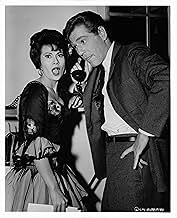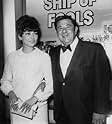AVALIAÇÃO DA IMDb
7,0/10
7,5 mil
SUA AVALIAÇÃO
Um grupo variado de passageiros de um navio com destino à Alemanha de pouco antes da Segunda Guerra representa um microcosmo da sociedade dos início dos anos 30.Um grupo variado de passageiros de um navio com destino à Alemanha de pouco antes da Segunda Guerra representa um microcosmo da sociedade dos início dos anos 30.Um grupo variado de passageiros de um navio com destino à Alemanha de pouco antes da Segunda Guerra representa um microcosmo da sociedade dos início dos anos 30.
- Direção
- Roteiristas
- Artistas
- Ganhou 2 Oscars
- 5 vitórias e 13 indicações no total
José Ferrer
- Siegfried Rieber
- (as Jose Ferrer)
José Greco
- Pepe
- (as Jose Greco)
Heinz Rühmann
- Julius Löwenthal
- (as Heinz Ruehmann)
- Direção
- Roteiristas
- Elenco e equipe completos
- Produção, bilheteria e muito mais no IMDbPro
Avaliações em destaque
"Ship of Fools" it may be, but it is also a Ship of Stars: Oskar Werner, Vivien Leigh, Lee Marvin, Simone Signoret, Jose Ferrer, Elizabeth Ashley, George Segal, and Michael Dunn.
Directed by Stanley Kramer, this 1965 film deals with a German ship heading to its port in Bremerhaven in 1933 and the lives of some of its passengers. Dunn speaks to the audience at the beginning and end of the film, telling us at first that it is a ship of fools and that we may find ourselves in some of the characters.
This is one of the best all-star casts ever assembled, right up there with "All About Eve" and "The Long, Hot Summer."
The performances are as magnificent as the film is relentlessly depressing, with a Jewish man put at a table with a dwarf, while at the captain's table, another man preaches about the new Germany and extermination of Jews, the elderly, and those who are not fit.
The optimistic Jew thinks Germany owes the Jews a great deal and vice versa, and with 1 million Jews there, certainly no one is going to kill all of them.
A drug-addicted woman is being deported to an island, and the very ill ship's doctor falls in love with her and is tempted to give up his miserable life to care for her.
A couple with a passionate sex life finds they are poles apart in every other way. A bitter, middle-aged woman comes to grips with her loneliness and tries to drink it away.
And on and on, on the ship of fools. By the end of the film, looking at the Jew's beautiful family on the dock, the viewer is ready to reach for a razor blade.
Oskar Werner (Tyrone Power's son-in-law) gives a magnificent performance as a man discouraged about his life full of obligations, exhausted from ill health, and reaching out for one last chance at happiness.
Simone Signoret, who falls for the doctor, is a warm and sympathetic countess, nervous about her future, her past dried up. Lee Marvin, as a southern drunk who wants to get laid, is perfection - Vivien Leigh herself was impressed with him. "What's this about the Jews?" he asks her. "I never saw a Jew until I was 15." "Perhaps you were too busy lynching Negroes to care about the Jews," she replies.
For Vivien Leigh, Scarlett is far behind her - 26 years behind her, in fact, with almost no vestige of her left due to Leigh's battles with manic-depression and the dissolution of her marriage to Laurence Olivier. As Scarlett herself would have said, "That girl doesn't exist anymore."
Her character is the Blanche Dubois who didn't go to the asylum and some years later takes a cruise. Even the last gown she wears, as she dances the Charleston, is reminiscent of Blanche.
It's a great performance as a beautiful woman who has seen better days and is disillusioned and bitter about men, love, and romance. Her big scenes at the end of the film - in the hallway and with Marvin - are fantastic.
I have to believe, though "Ship of Fools" is downbeat, that it leaves us with some hope. Dunn, as the dwarf philosopher, is too smart to stick around Germany once things heat up; perhaps his Jewish friend will see the light before it's too late.
The Countess is a survivor; no reason she shouldn't survive the island. But for all of them, a certain way of life has ended, and they won't be going back.
One of the great films of the '60s.
Directed by Stanley Kramer, this 1965 film deals with a German ship heading to its port in Bremerhaven in 1933 and the lives of some of its passengers. Dunn speaks to the audience at the beginning and end of the film, telling us at first that it is a ship of fools and that we may find ourselves in some of the characters.
This is one of the best all-star casts ever assembled, right up there with "All About Eve" and "The Long, Hot Summer."
The performances are as magnificent as the film is relentlessly depressing, with a Jewish man put at a table with a dwarf, while at the captain's table, another man preaches about the new Germany and extermination of Jews, the elderly, and those who are not fit.
The optimistic Jew thinks Germany owes the Jews a great deal and vice versa, and with 1 million Jews there, certainly no one is going to kill all of them.
A drug-addicted woman is being deported to an island, and the very ill ship's doctor falls in love with her and is tempted to give up his miserable life to care for her.
A couple with a passionate sex life finds they are poles apart in every other way. A bitter, middle-aged woman comes to grips with her loneliness and tries to drink it away.
And on and on, on the ship of fools. By the end of the film, looking at the Jew's beautiful family on the dock, the viewer is ready to reach for a razor blade.
Oskar Werner (Tyrone Power's son-in-law) gives a magnificent performance as a man discouraged about his life full of obligations, exhausted from ill health, and reaching out for one last chance at happiness.
Simone Signoret, who falls for the doctor, is a warm and sympathetic countess, nervous about her future, her past dried up. Lee Marvin, as a southern drunk who wants to get laid, is perfection - Vivien Leigh herself was impressed with him. "What's this about the Jews?" he asks her. "I never saw a Jew until I was 15." "Perhaps you were too busy lynching Negroes to care about the Jews," she replies.
For Vivien Leigh, Scarlett is far behind her - 26 years behind her, in fact, with almost no vestige of her left due to Leigh's battles with manic-depression and the dissolution of her marriage to Laurence Olivier. As Scarlett herself would have said, "That girl doesn't exist anymore."
Her character is the Blanche Dubois who didn't go to the asylum and some years later takes a cruise. Even the last gown she wears, as she dances the Charleston, is reminiscent of Blanche.
It's a great performance as a beautiful woman who has seen better days and is disillusioned and bitter about men, love, and romance. Her big scenes at the end of the film - in the hallway and with Marvin - are fantastic.
I have to believe, though "Ship of Fools" is downbeat, that it leaves us with some hope. Dunn, as the dwarf philosopher, is too smart to stick around Germany once things heat up; perhaps his Jewish friend will see the light before it's too late.
The Countess is a survivor; no reason she shouldn't survive the island. But for all of them, a certain way of life has ended, and they won't be going back.
One of the great films of the '60s.
One of my favorite indulges over the years has been "Ship of Fools," a 1965 glossy, episodic entertainment done strictly grand scale. Based on Katherine Anne Porter's epic novel, the Oscar-nominated "Best Picture" centers on a sundry group of travelers circa 1933 who clash "Grand Hotel" style on a German ocean liner bound, via Mexico, for Germany (and impending doom it would seem) just as strong Nazi sentiment was breeding. The ship becomes a microcosm of pre-WWII life and mores, with a plethora of subplots alternately swelling and ebbing throughout - situations that alter the course of some of its passengers and crew members, for better or worse.
From the clever opening collage of credits (don't miss this part) set to a catchy, flavorful Latin score to its fascinating all-star disembarkation at the end, it's smooth sailing for most of this trip, guided with an assured hand by the always capable Stanley ("Judgment at Nuremberg") Kramer, with certain cast members (Simone Signoret, Oskar Werner, Vivien Leigh, Lee Marvin, Michael Dunn) coming off better than others (José Ferrer, Elizabeth Ashley, George Segal).
A number of compelling vignettes acted out by the choice, eclectic ensemble make up for the sometimes turgid melodramatics that occur on board as our "ship of fools" are forced to examine their own pride and prejudice while victimized by others. Who can forget the tormented Simone Signoret and Oskar Werner (both Oscar-nominated) as the morphine-addicted political prisoner and dutiful ship's physician who provide the film with its most poignant and tragic shipboard romance. Their clandestine encounters are exquisitely written and beautifully realized. Or Vivien Leigh's coy, aging elitist, Mary Treadwell, who delivers a brilliantly despairing monologue in front of a makeup mirror that, in turn, sets up a wildly climactic shoe-bashing scene with Lee Marvin's besotted baseballer when he viciously assaults, then profusely apologizes to the now-humiliated matron after mistaking her in the dark for a cooch dancer. Or José Greco & company's steamy, frenetic flamenco sequence during a raucous, after-hours party. Or dwarf actor Michael Dunn's sublime Greek Chorus that effectively bookends the movie (the Oscar-nominated Dunn subsequently played evil Dr. Loveless on TV's "Wild, Wild West" series). These glorious scenes and more help to balance out the less serviceable ones, particularly those involving Jose Ferrer's boisterous, irritating Nazi bigot who borders on caricature, and Elizabeth Ashley and George Segal's turbulent lovers who come off dull and forced.
Ernest Laszlo's lustrous black-and-white cinematography was suitably Oscar awarded, while the whole look, feel and tone of the movie is decidedly old-style theatre at its best. This movie has remained one of my all-time favorite wallows.
From the clever opening collage of credits (don't miss this part) set to a catchy, flavorful Latin score to its fascinating all-star disembarkation at the end, it's smooth sailing for most of this trip, guided with an assured hand by the always capable Stanley ("Judgment at Nuremberg") Kramer, with certain cast members (Simone Signoret, Oskar Werner, Vivien Leigh, Lee Marvin, Michael Dunn) coming off better than others (José Ferrer, Elizabeth Ashley, George Segal).
A number of compelling vignettes acted out by the choice, eclectic ensemble make up for the sometimes turgid melodramatics that occur on board as our "ship of fools" are forced to examine their own pride and prejudice while victimized by others. Who can forget the tormented Simone Signoret and Oskar Werner (both Oscar-nominated) as the morphine-addicted political prisoner and dutiful ship's physician who provide the film with its most poignant and tragic shipboard romance. Their clandestine encounters are exquisitely written and beautifully realized. Or Vivien Leigh's coy, aging elitist, Mary Treadwell, who delivers a brilliantly despairing monologue in front of a makeup mirror that, in turn, sets up a wildly climactic shoe-bashing scene with Lee Marvin's besotted baseballer when he viciously assaults, then profusely apologizes to the now-humiliated matron after mistaking her in the dark for a cooch dancer. Or José Greco & company's steamy, frenetic flamenco sequence during a raucous, after-hours party. Or dwarf actor Michael Dunn's sublime Greek Chorus that effectively bookends the movie (the Oscar-nominated Dunn subsequently played evil Dr. Loveless on TV's "Wild, Wild West" series). These glorious scenes and more help to balance out the less serviceable ones, particularly those involving Jose Ferrer's boisterous, irritating Nazi bigot who borders on caricature, and Elizabeth Ashley and George Segal's turbulent lovers who come off dull and forced.
Ernest Laszlo's lustrous black-and-white cinematography was suitably Oscar awarded, while the whole look, feel and tone of the movie is decidedly old-style theatre at its best. This movie has remained one of my all-time favorite wallows.
Vivien Leigh sits opposite redneck Lee Marvin in the ship's upper deck restaurant, Marvin confesses to Leigh he never new what a Jew was until he was 15, "You were too busy lynching blacks" is her replay. I thought to mention it just to give you a hint of the sort of cruise ship we're travelling on. We sail through a sea that goes from the sublime to the ridiculous. Abby Mann is a master at drawing characters with long shadows and Kramer a master at capturing them. Think "Judgement at Neuremberg" Here you'll feel sea sick sometimes but the trip is worth taking. I mean. Vivien Leigh and Lee Marvin in a sad comedy of errors. Simone Signoret as a drug addicted countess and Oskar Werner her kindly, tragic, doctor, pusher. Highly charged, beautifully written moments. The lower decks for the down trodden is full of extras. George Segal and Elizabeth Ashley try both decks and and a deck all their own with melodramatic regularity. Jose Ferrer and Heinz Rhumman have one of my favourite exchanges. Ferrer, the German military tells Rhumman, the German Jew, that he should admit that the Jews are great part of the German problem. Rhumman calmly agrees and ads "true, but not only the Jews, also men who smoke the pipe are great part of the German problem" "Why men who smoke the pipe?" Shouts Ferrer. To what Rhumman replies "Why the Jews?" Michael Dunn addresses us directly, asking us to find ourselves among the passengers. Okay.
A modernist morality tale with several different dark, sardonic stories. It creates a strange mood with its post WWII sensibility superimposed on pre-Nazi German culture. It's like The Love Boat as told by Ambrose Bierce. The best story revolves around Oskar Werner as he takes care of Simone Signoret. He sits at her bedside and listens with his head at a ridiculous angle to show his complete understanding - their situations are parallel, but their compositions are worlds apart. His slow slide into oblivion is fascinating to watch.
But the best performance belongs to Vivien Leigh in her final film role. She is absolutely stunning as "the 46-year old coquette" (as Werner Klemperer puts it). It's a terrible tragedy that she was not able to make very many movies in her career.
However, I have never cared for George Segal or Elizabeth Ashley and they weaken the film - particularly Segal who seems overmatched by the other members of the cast. But I did enjoy the rest of the movie and it's well worth getting through their story to see it.
But the best performance belongs to Vivien Leigh in her final film role. She is absolutely stunning as "the 46-year old coquette" (as Werner Klemperer puts it). It's a terrible tragedy that she was not able to make very many movies in her career.
However, I have never cared for George Segal or Elizabeth Ashley and they weaken the film - particularly Segal who seems overmatched by the other members of the cast. But I did enjoy the rest of the movie and it's well worth getting through their story to see it.
A strange, rather offbeat morality tale from Katherine Anne Porter's bulky novel, SHIP OF FOOLS manages to hold interest even though the characters are never fully realized and the full potential of the novel isn't to be found in the screenplay.
It's best described as a multi-episode GRAND HOTEL at sea, episodic with the love story between Simone Signoret and Oskar Werner at the core and easily the best acted piece, despite the soap-opera overtones. Vivien Leigh's bitter American widow is somewhat theatrical--but comes to life finally in the scene where she uses her shoe to beat Lee Marvin when he makes drunken advances to her. She looks somewhat worn and fragile (which the role requires) and this was her last film only two years before her death.
Porter's novel made diabolic use of the twin children who are almost missing from the screenplay. George Segal and Elizabeth Ashley are wasted in lesser roles as young romantics. Michael Dunn is sly and altogether winning as the dwarf who opens and closes the film with his narrative. Charles Korvin is excellent as the ship's Captain who is constantly giving advice to Oskar Werner who stubbornly refuses to listen to his well meaning friend.
If the story interests you, try reading the novel--much more complex, much richer in characters and atmosphere. The film is overlong, has some dull stretches and has a meager score by Ernest Gold that is oddly silent during some of the most emotional moments. A good old-fashioned musical score by someone like Max Steiner would have helped immeasurably in getting over the dull spots.
Summing up: too preachy when dealing with anti-semitism and lacks the punch of the novel.
It's best described as a multi-episode GRAND HOTEL at sea, episodic with the love story between Simone Signoret and Oskar Werner at the core and easily the best acted piece, despite the soap-opera overtones. Vivien Leigh's bitter American widow is somewhat theatrical--but comes to life finally in the scene where she uses her shoe to beat Lee Marvin when he makes drunken advances to her. She looks somewhat worn and fragile (which the role requires) and this was her last film only two years before her death.
Porter's novel made diabolic use of the twin children who are almost missing from the screenplay. George Segal and Elizabeth Ashley are wasted in lesser roles as young romantics. Michael Dunn is sly and altogether winning as the dwarf who opens and closes the film with his narrative. Charles Korvin is excellent as the ship's Captain who is constantly giving advice to Oskar Werner who stubbornly refuses to listen to his well meaning friend.
If the story interests you, try reading the novel--much more complex, much richer in characters and atmosphere. The film is overlong, has some dull stretches and has a meager score by Ernest Gold that is oddly silent during some of the most emotional moments. A good old-fashioned musical score by someone like Max Steiner would have helped immeasurably in getting over the dull spots.
Summing up: too preachy when dealing with anti-semitism and lacks the punch of the novel.
Você sabia?
- CuriosidadesVivien Leigh was subject to bouts of depression and alcoholism and was abrasive to fellow actors. There was a rocky start to her relationship with Lee Marvin, complaining about his stale alcohol breath. Eventually, the two became highly unlikely good friends.
- Erros de gravaçãoAlthough set in 1933, the hairstyles and costumes are decidedly mid-1960s.
- ConexõesEdited into Spisok korabley (2008)
Principais escolhas
Faça login para avaliar e ver a lista de recomendações personalizadas
- How long is Ship of Fools?Fornecido pela Alexa
Detalhes
Bilheteria
- Orçamento
- US$ 4.000.000 (estimativa)
- Faturamento bruto mundial
- US$ 206
- Tempo de duração
- 2 h 29 min(149 min)
- Cor
- Mixagem de som
- Proporção
- 1.85 : 1
Contribua para esta página
Sugerir uma alteração ou adicionar conteúdo ausente








































